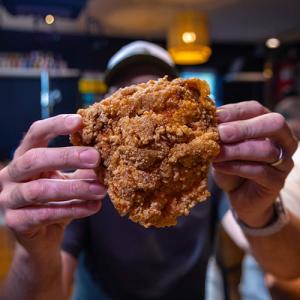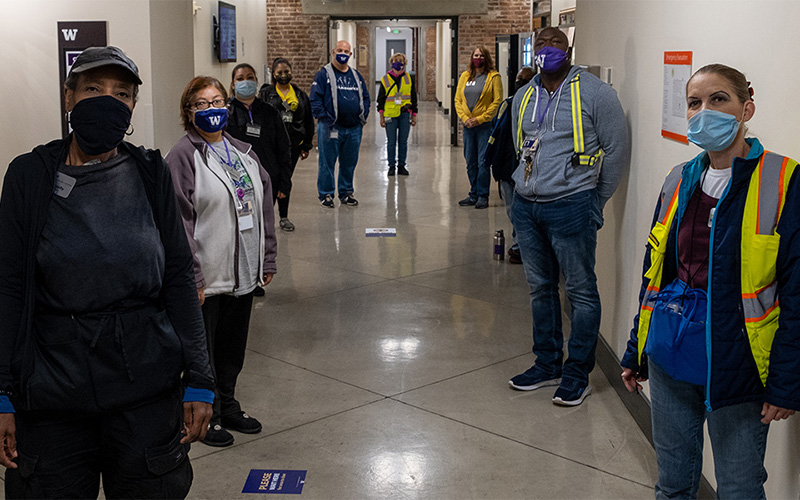
Custodial Superheroes
The stalwart UW Tacoma custodial team is keeping campus shiny even while most of us are working and learning remotely.
(Photo above: members of the UW Tacoma custodial team. From left: Shirley Dority, Laura Martinez, Maria Sandoval, Sandra Garcia, Dennis Bitz, Svetlana Tetlov, Helen Baker-Gates, Janet Salazar, Mike Jones, Ryan Kinsella-Harmon.)
This will be a fall like none in recent memory. This time last year campus was abuzz with activity as students, faculty and staff returned for the start of a new academic year. Hundreds gathered in person at Convocation to celebrate with music, food and hopeful messages about the months ahead. We had no way of knowing what was to come.
Coronavirus crept into our collective consciousness in early 2020 and COVID-19 changed just about everything in our daily lives. Businesses and schools, including UW Tacoma, dramatically altered operations to attempt to stop the virus from spreading.
For some, the adjustment to virtual work and learning has been hard. Many of our students have full-time jobs, some are parents. All are striving to achieve their goal of earning a college degree. It has never been easy, but it is no doubt harder now.
If the pandemic has taught us anything, it is this: the future is uncertain. A year from now we may see each other again on campus. If that is to happen, a select group of people, UW Tacoma custodians, will have helped make it possible.
***
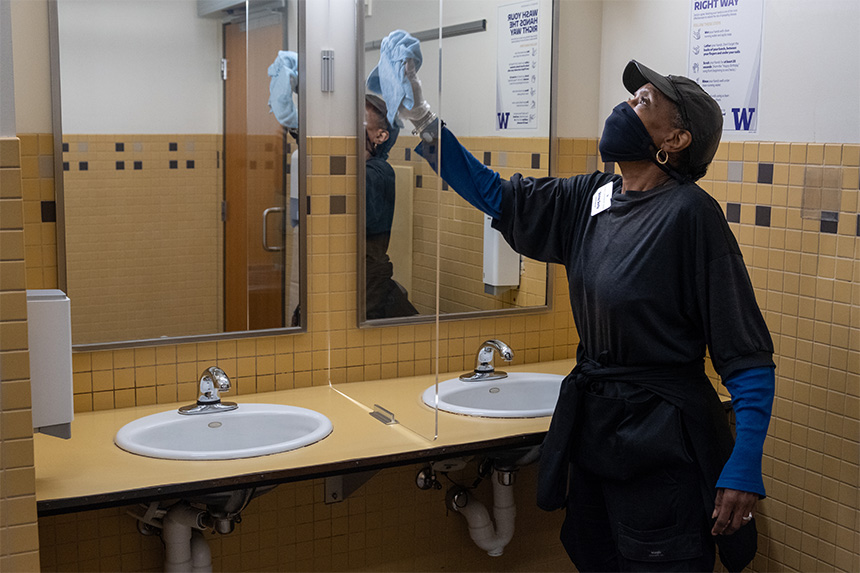
More than 90% of classes at UW Tacoma this fall will be held online. This means that, yes, there will be some students, faculty and staff on campus. Keeping people safe will depend on a few factors. First, everyone who comes to campus is required to wear a mask and practice social distancing. Second, people who contract the virus stay home. Third, classrooms and study spaces will need to be cleaned on a regular basis.
Figuring out how to make that third item work is something Tessa Coleman, Charity Matsuda and a team of cleaners have been working on these past few months. Coleman is the Associate Director of Maintenance & Operations. Matsuda is the Custodian Supervisor.
UW Tacoma recently switched to an in-house janitorial model. Until this past summer the university hired contractors to do the necessary work of cleaning the campus. “It was actually cheaper to go in-house than it was to continue with contractors and go through the bidding process,” said Coleman. “This factor helped sell the program, but it wasn’t the only reason why we decided to make the transition.”
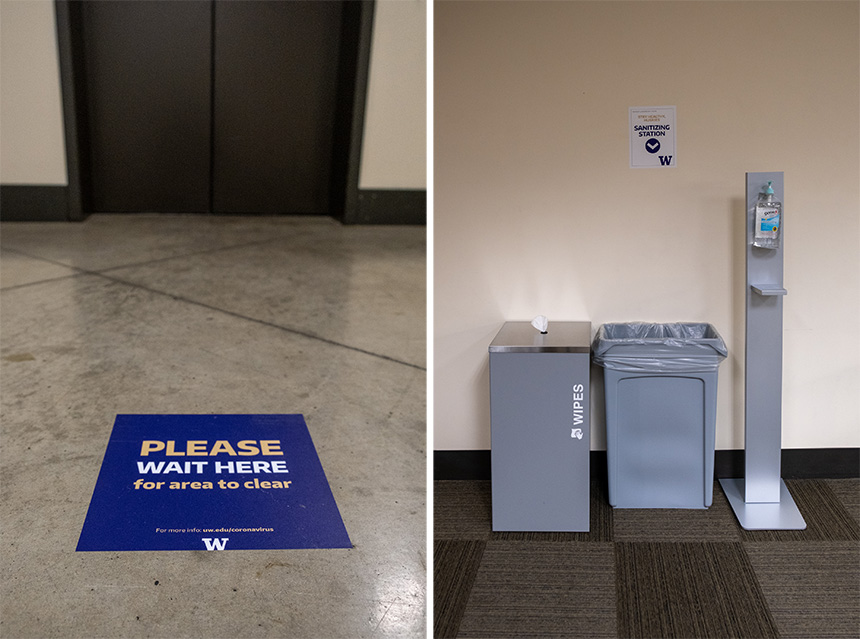
The switch brought with it benefits for both employees and the UW. Until now, the custodial staff weren’t classified as UW employees. They are now which means they are eligible to receive benefits and are part of a union. “UW Tacoma is not motivated by the bottom line,” said Coleman. “We’re a university and we have purpose but we’re also a family.”
In all, 13 people were hired through a competitive process. Most of those were people who did custodial work at UW Tacoma as contracted labor. “Charity has done a great job of making her team as versatile and holistic as possible,” said Coleman. “When we used contractors that person would only work a particular building or do certain things and that would be an issue if someone called in sick and their replacement for the day had no idea what to do because they’d never worked here before.”
***
The custodial crew has had a busy summer. “They vacuumed edges, they scrubbed walls and wiped partitions,” said Coleman. “It’s not just disinfected, it’s shiny.” This deep clean was, in many ways, just the beginning. “We use EPA-registered and approved, hospital-grade disinfectants and we have a process of going through and wiping down touch points like door handles, light switches, tables, chairs and white boards,” said Matsuda. “All classrooms that are going to be in use will be getting daily touch ups.”
Reducing risk will be everyone’s job. “We have some back-to-back classes so that means students and faculty will be asked to clean the area around them when they leave,” said Matsuda. “We will have sanitization stations in these classrooms and in campus study spaces. These stations come equipped with sanitary wipes as well as hand sanitizer.”
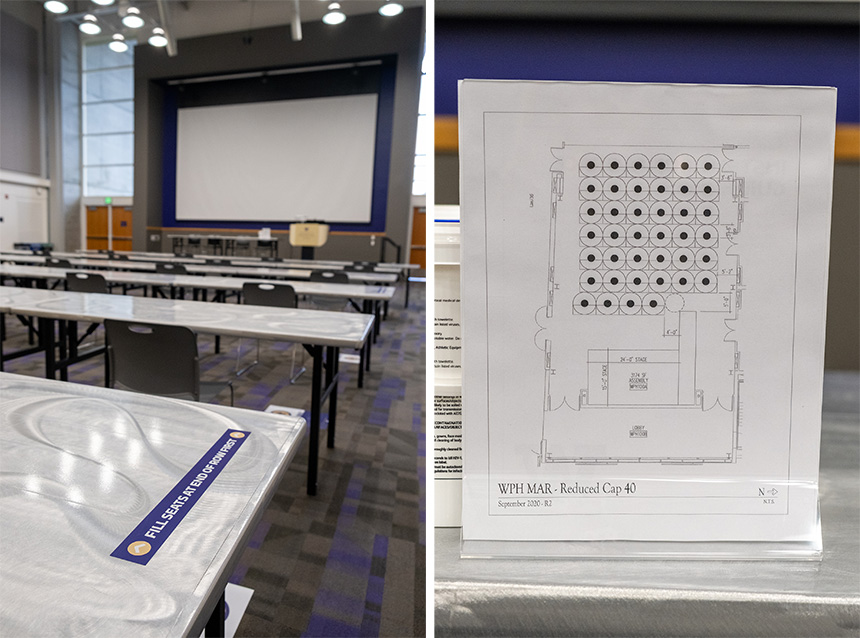
One of the trickier components of having people safely return to campus is figuring out where to hold class. Social distancing guidelines limit the amount of people who can be in a space at any given time. “This means a room that could previously hold 64 can now only accommodate 24,” said Coleman. “We’ve converted Philip Hall into a classroom and it’s our largest. It can now seat only 40.” (Pre-virus, its capacity was 460.)
Coleman, Matsuda and their team also had to figure out how to move people in and out of classrooms and buildings. “You don’t get to just go in a building and then exit,” said Coleman. “There are directional signs that tell you where to go in and where to go out.”
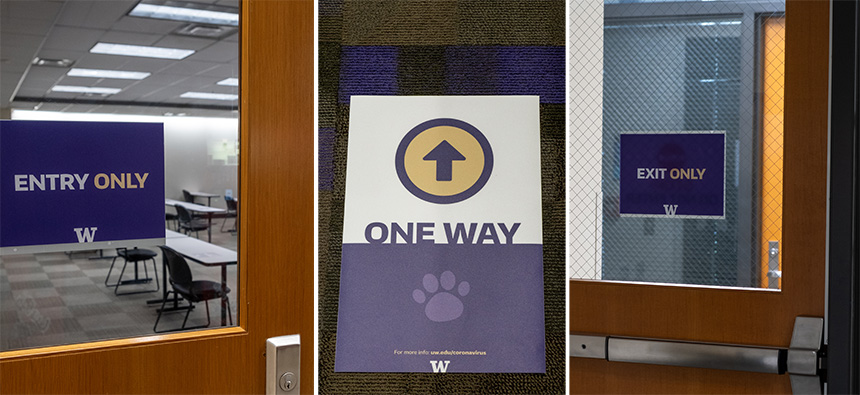
There are other changes. Faculty and staff won’t have their offices serviced unless they’re using them and even then, it won’t be every day. “Individual spaces that are occupied will be vacuumed every other week,” said Coleman. “We have limited resources and want to focus on areas of high use, like open areas, study spaces and restrooms.” When it comes to waste collection, faculty and staff are being encouraged to take care of it themselves whenever possible and to dispose of it in the correct place.
***
This is the beginning of what could be a very unusual academic year. The ability to safely return to campus depends on so many things including the essential work performed by a small group of dedicated professionals. And keeping them safe is top of mind. “Everyone on our team has personal protective equipment (PPE) and will wear masks at all times while in buildings,” said Matsuda. “They will change gloves anytime they come in and out of a classroom. We will also be getting respirators and other PPE in case they are needed. Our goal is to keep our team as safe as possible.”
